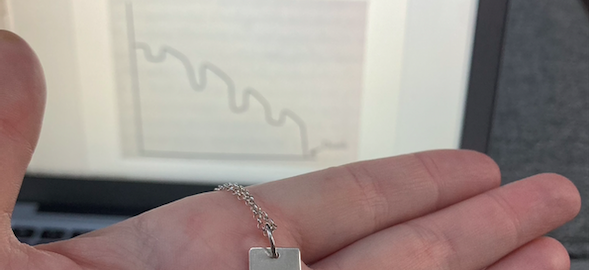For want of a functioning kidney, my immune system is suppressed. In the absence of an intact immune system, I am prone to infections. Having more than one infection in a short amount of time (or the same infection persists beyond an initial treatment), and more than one antibiotic is used, my gut biome developed Clostridium difficile Toxin B gene, and Stl c-diff Toxin A&B — commonly known as “c-diff.”
I’ve heard this diagnosis applied in my general vicinity before (in 2009 and 2018), so it didn’t ricochet off my mind as unimaginable. That phenomenon does happen sometimes — having no prior knowledge of something makes it harder to reconcile — just not this time. What was new was every single medical person I spoke to asked if I’d had it before.
I’m pretty sure that’s code for: “If this happens once, it is more likely to happen again.“
And: “If you have been through this symptom profile, you know what is happening.“
Recognizing and deciphering unusual language and codes is part of the experience of illness, not unique to chronic or life-impacting ones. Who remembers the first time they fully connected all of the terms and slang of throwing up with the act and result of vomiting? That labeling probably is not recognized — but it all becomes part of the experience known and understood in the mind-body.
What would I do differently? None of it. The functioning kidney, suppressed immune system, treating adverse conditions as they come (even with risks) = steps on the path adjacent to being with my loved ones. I added this experience to the medical history I keep in my purse. I made other revisions, too.

I’ve spent a significant amount of time thinking, reading, and journaling about pain and concern, and how to communicate it to medical teams meaningfully. I debated some form of calibration that allowed people to have shared understanding — with the hope that although my “4” might be your “6,” knowing that about each other gives us opportunities to connect. I have realized that across a variety of metrics about pain/concern, I tend to put the most emphasis on a convergence of intensity, fear, and quality of life.
These already take into account my familiarity (I’m not as afraid or limited by physical and emotional pains I have experience with), plus I have a strong history of navigating medical systems ranging from the various jargons/codes to expectations typical in a variety of situations. These have given me some sense of how to gauge changes in my suffering over time — what may alleviate or aggravate, cycles, paying attention to trends over 24 hours, etc.
It’s not yet clear how prominently c-diff will feature in my life…it could resolve without further incident, it could happen again, it could be that I never return to the normal I knew before this diagnosis (or so I’ve been told). So I added this to my purse reference:

This is the path I’m on (I think). I try to keep it as close as I can to the people I love, and I know that I am on my own journey which will have an end. I’m taking high potency probiotics to rebuild my digestive biome, I’m drinking viscous orange psyllium fiber supplement, I’ve changed my diet to be gentler on my system (no dairy, no fats, no raw fruits/veggies), and I’m awaiting a CT scan to check on my colon (although my liver also seems to be stressed). I’ll do all The Things that keep my path as close as I can to the people I love for as long as the time I have. It’s my answer to the question posed by Arthur Frank in Wounded Storyteller: “If I become ill again, or when I do, how will I find ways to avoid feeling that my life is diminished by illness and eventually dying?” That’s all part of our family history together, so it’s familiar and those steps are clear. In knowing that, I am less afraid of the parts that are uncertain. In any case, I am deeply grateful to be here now.
Also, “we take each day as it comes,” has become something of a mantra in our house during these times of SARS-Co-V2. Hopefully, we’re all learning together.

End blip.
